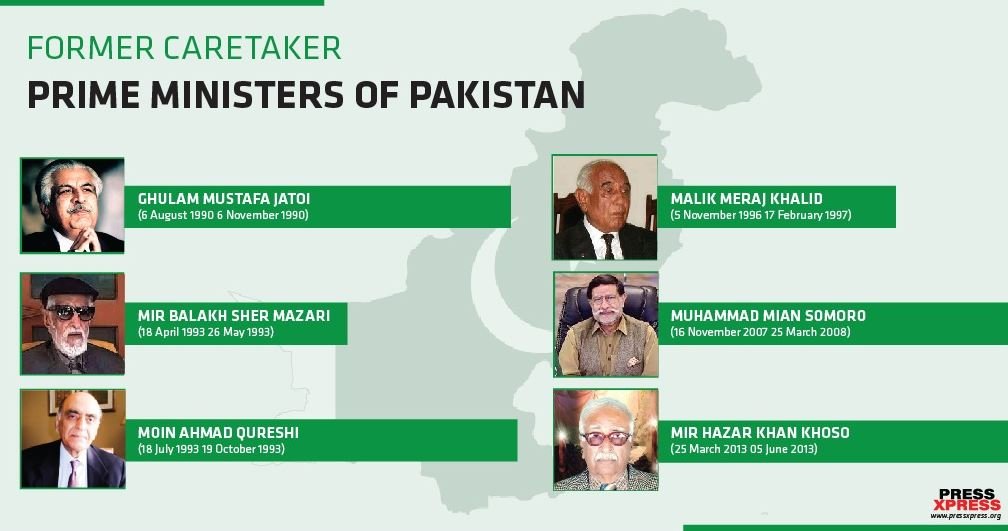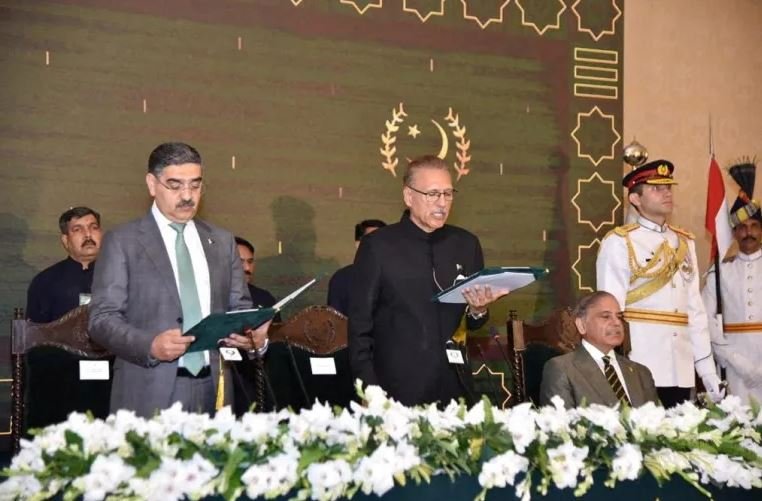The South Asian nation continues to struggle with skyrocketing inflation, a fragile currency, and diminishing foreign exchange reserves. The majority of financial experts believe that implementing the fund’s program will be the most difficult task for the new government.
Pakistan’s recently appointed caretaker prime minister, Anwaar-ul-Haq Kakar, finds himself at a critical juncture as the nation navigates a series of multifaceted challenges. Less than three months remain until the scheduled general elections, and Kakar’s responsibilities include addressing a variety of complex challenges involving the IMF, economic revival, climate challenges, diplomatic relations, and political stability.
On August 14, 52-year-old Kakar assumed leadership of Pakistan, a 240-million-person nation entangled in a multitude of problems on multiple fronts. He is an obscure member of the Balochistan Awami Party, which is widely regarded as having close ties to the country’s potent military.
You can also read: Did US Ask for Imran Khan’s Removal as Pakistan PM?
Pakistan’s northwestern Khyber Pakhtunkhwa (KP) province has seen an increase in militant attacks at the same time that the South Asian nation is grappling with an economic crisis and deepening political instability, with prominent opposition politician Imran Khan behind bars on corruption charges. Since he took office, the Pakistani government has increased petrol prices by Rs20 per liter, sparking concerns of further inflation, while the Pakistani rupee has lost over six rupees against the U.S. dollar.
Economic stabilization to implement the IMF mandate
The effective implementation of the International Monetary Fund’s (IMF) program is one of the multifaceted obstacles that Kakar’s government must overcome. With a $3 billion standby agreement in place, aimed at averting a sovereign default, Pakistan’s economic revival hinges on adhering to stringent measures.
The South Asian nation continues to struggle with skyrocketing inflation, a fragile currency, and diminishing foreign exchange reserves. The majority of financial experts believe that implementing the fund’s program will be the most difficult task for the new government.
“The caretakers at the federal level are going to face numerous challenges vis-a-vis the nine-month $3 billion SBA with the IMF,” Dr. Ikram ul Haq, a Lahore-based senior economist said.
The administration must attain the primary surplus targets set by the IMF while managing the high cost of borrowing for day-to-day expenses. Considering the sluggish revenue streams of the economy, this endeavor necessitates drastic cuts in spending. According to IMF, the IMF program also urged Pakistan to adopt an appropriately constrained monetary policy aimed at disinflation and demanded further progress on structural reforms, particularly with regard to the viability of the energy sector, the governance of state-owned enterprises, and climate resilience.
“It needs drastic cuts in expenditure as the revenue stream due to [Pakistan’s] sluggish economy cannot be improved,” Dr. Haq added.
Moreover, bridging the gap between interbank and open market exchange rates is imperative, necessitating the adoption of rigorous measures by the State Bank to counter speculative activities. As dollar to rupee parity becomes increasingly significant, the US dollar was trading at approximately Rs297.20 on the interbank market and Rs305 on the open market on Tuesday (today).

Balancing diplomacy and economic interests
The delicate mission of advancing Arab investments while maintaining diplomatic neutrality awaits Kakar as he assumes office. Pakistan’s economic revival is dependent on attracting foreign investments, particularly from Saudi Arabia and the United Arab Emirates.
Former chairman of the Board of Investment (BoI) Haroon Sharif believes that advancing projects identified by the Special Investment Facilitation Council (SIFC), a hybrid civil-military government body formed by the outgoing government to attract international investments in mining, agriculture, and other sectors, will be a difficult task for the caretaker government.
“The approved projects are mostly with Saudis and UAE and now they will face pressure to deliver on those projects and finalize transactions,” Sharif said.
However, it is difficult to strike a balance between economic interests and diplomatic autonomy. Analysts believe, the government of Kakar must navigate this terrain with caution, ensuring that economic partnerships do not jeopardize Pakistan’s sovereignty.
Tackling security threats and ensuring political stability
The security situation in Pakistan remains of grave concern as militant attacks have intensified, particularly in the northwestern Khyber Pakhtunkhwa (KP) province and Balochistan. Hassan Khan, a security analyst, emphasizes the urgency of this issue, “The caretaker government would not have the required capacity and decision-making space to handle the issue of terrorism in both provinces.” Close attention will be paid to the administration’s capacity to resolve security concerns while fostering an environment conducive to transparent elections.
In addition, the delicate political climate adds another layer of difficulty to the mission at hand. The administration of Kakar must navigate the complexities of the ongoing political and constitutional crisis, which has been developing for months. Fawad Chaudhry, former information minister, acknowledges the situation’s intricacies: “We may see Kakar taking decisions on economy and security due to the establishment’s backing.”
The credibility of the impending elections will be determined by the administration’s capacity to engage with all political parties, especially Imran Khan’s Pakistan Tehreek-e-Insaf (PTI). The key to Pakistan’s political stability would be to strike a balance between democratic processes and policy-making authority.
Environmental vulnerabilities
In addition to significant challenges in the economic, diplomatic, security, and political spheres, Pakistan’s caretaker government faces the pressing issue of climate change. The devastating floods of 2022, which exacerbated the country’s already fragile economy, amplified the country’s susceptibility to extreme weather. As Pakistan prepares to attend the COP28 climate conference hosted by the UAE from 30 November to 12 December, the caretaker government confronts the challenge of ensuring effective representation and advocating for Pakistan’s interests on the international stage.
Recent research has revealed altering climate patterns in Pakistan, posing an enormous challenge for the nation. Increasing temperatures, unpredictable monsoon seasons, and shifting precipitation patterns have direct effects on agriculture, livelihoods, and water availability. The delicate task of balancing economic development with climate resilience emerges. International partners and Pakistan’s citizens will scrutinize Pakistan’s commitment to combating climate change, particularly the implementation of sustainable policies.
In conclusion, Anwaar-ul-Haq Kakar’s tenure as caretaker prime minister is of crucial significance in the context of Pakistan’s complex challenges. The nation’s future will be determined by his skill in addressing multifaceted challenges, including economic, security, and political complexities. In the coming months, his ability to forge innovative solutions that safeguard both short-term stability and long-term development will be put to the test.


